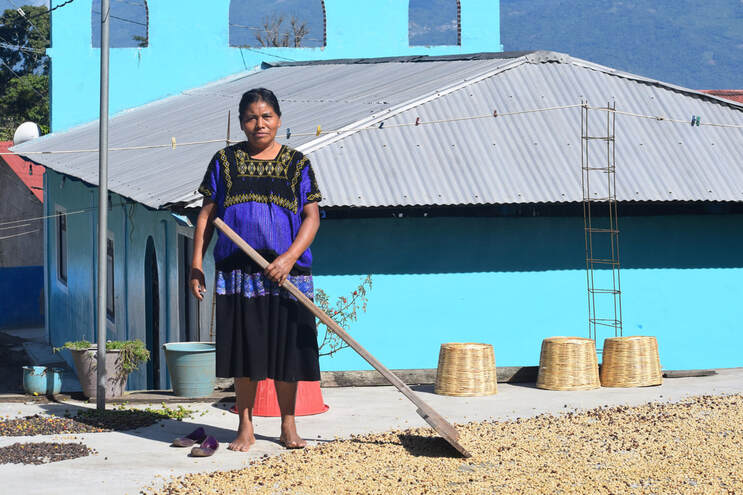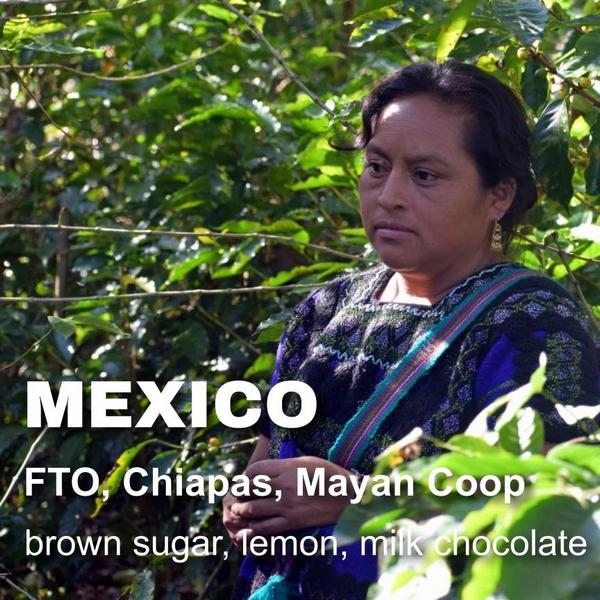- NOW IN STOCK!
- >
- Mexico
Mexico
SKU:
$6.25
6.25
66
$6.25 - $66.00
Unavailable
per item
Chiapas area, Tzeltal-Tzotzil Coop, Fair-Trade Organic
About the coffee
- Cupping notes: Citric acidity, full body, smooth and sweet, notes of brown sugar, milk chocolate, and orange
- Cultivation: Shade-grown in the Sierra Madre mountains of Chiapas, near the Guatemalan border
- Varieties: Bourbon, Mundo Novo, Typica
- Elevation: 4,800 feet
- Processing: Fully washed, mechanically-dried
About the people who grow it
 Photos supplied by Royal Coffee NY
Photos supplied by Royal Coffee NY
This coffee is sourced from the family-owned farms associated with the Tzeltal-Tzotzil Cooperative Production Society, operating in the northern part of Chiapas, Mexico near Guatemala, in the Sierra Madre mountains. Founded in 1986 with 19 partners, the Tzeltal-Tzotzil coop currently has 198 producers from 5 municipalities in the Los Altos de Chiapas region. Despite historically poor infrastructure, unemployment, high illiteracy rates, and low life expectancy in Los Altos de Chiapas, the Tzeltal and Tzotzil indigenous peoples have been making outstanding progress. The production and marketing of honey and coffee have been the main activities of the "tzeltal-tzotzil" cooperative.
Exceptional care is taken by producers to depulp, ferment and dry their coffee, which is aided by the use of farm-owned micro mills. Coffee farms from this organization tend to be less than ten acres in size, and produce honey as well as coffee. Farm owners and producers have focused on organic production methods to protect the environment, increase overall quality, and gain higher income to improve the livelihood of their families. The environmental diversity of mountains and valleys provides soil rich with calcium and limestone, creating a high quality coffee product. The Mayan cooperative members use traditional knowledge as their basis for organic farming methods, in addition to trainings financed through Fair Trade premiums.
The indigenous Tzotzil- and Tzeltal-speaking highland Mayan peoples constitute the majority of the municipio of Pantelhó—which means "bridge over water" in Tzotzil. The Tzotzil and Tzeltal languages are closely-related languages from the Maya-Quiché family. These two languages are, to some extent, mutually intelligible, and business may be conducted in either
Exceptional care is taken by producers to depulp, ferment and dry their coffee, which is aided by the use of farm-owned micro mills. Coffee farms from this organization tend to be less than ten acres in size, and produce honey as well as coffee. Farm owners and producers have focused on organic production methods to protect the environment, increase overall quality, and gain higher income to improve the livelihood of their families. The environmental diversity of mountains and valleys provides soil rich with calcium and limestone, creating a high quality coffee product. The Mayan cooperative members use traditional knowledge as their basis for organic farming methods, in addition to trainings financed through Fair Trade premiums.
The indigenous Tzotzil- and Tzeltal-speaking highland Mayan peoples constitute the majority of the municipio of Pantelhó—which means "bridge over water" in Tzotzil. The Tzotzil and Tzeltal languages are closely-related languages from the Maya-Quiché family. These two languages are, to some extent, mutually intelligible, and business may be conducted in either
